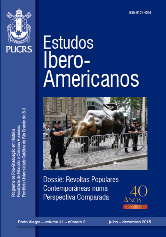O Tea Party e a batalha pelo futuro dos Estados Unidos
DOI:
https://doi.org/10.15448/1980-864X.2015.2.21303Palavras-chave:
extreme-right, United States, extremism, violence.Resumo
O Tea Party, que surgiu pouco depois de o presidente Barack Obama assumir o poder, é a mais recente encarnação do populismo norte-americano. Inúmeras questões – incluindo uma recessão econômica prolongada, os déficits orçamentários federais alarmantes, a preocupação com a imigração, os déficits fiscais, e uma resposta do governo aparentemente ineficaz para problemas – parecem ter alimentado o novo populismo de direita. Mas as mudanças demográficas nos Estados Unidos limitam o potencial do Tea Party e dos movimentos relacionados na medida em que quase exclusivamente ressoam junto aos americanos brancos. A menos que o Tea Party consiga apelar à população não branca dos EUA, a sua viabilidade, a longo prazo, é limitada.
Downloads
Referências
ABRAMOVITZ, Alan I. Obama’s Advantage: First Term Incumbents Rarely Lose but a Close Election Likely. Center for Politics, February 10, 2011. <http://www.centerforpolitics.org/crystalball/articles/
aia2011021001/>.
ADORNO, Thedor W. et al. The Authoritarian Personality. New York: Harper & Brothers, 1950.
BELL, Daniel (Ed.). The Radical Right. Garden City, NY: Anchor Books. 1964.
BENNETT, David H. Party of Fear: From Nativist Movements to the New Right in American History. New York: Vintage Books, 1988.
BERLET, Chip; LYONS, Matthew N. Right-Wing Populism in America: Too Close for Comfort. New York: The Guilford Press, 2000.
BLUMENTHAL, Paul. How David Brat Turned Eric Cantor’s Fundraising Advantage Against Him. The Huffington Post, June 11, 2014. <http://www.huffingtonpost.com/2014/06/11/david-bratfundraising_
n_5485047.html>.
BROYLES, J. Allen. The John Birch Society: Anatomy of Protest. Boston, MA: Beacon Press, 1964.
BUCHANAN, Patrick J. Suicide of a Superpower: Will America Survive to 2025? New York: Thomas Dunne Books. 2011.
CHALMERS, David M. Hooded Americanism: The History of the Ku Klux Klan. Third Edition. Durham, NC: Duke University Press, 1981.
DIAMOND, Sara. Roads to Dominion: Right-Wing Movements and Political Power in the United States. New York: Guilford Press, 1995.
EZEKIEL, Raphael S. The Racist Mind: Portraits of American Neo-Nazis and Klansmen. New York: Viking, 1995.
GALLAGHER, Eugene V. God and Country: Revolution as A Religious Imperative on the Radical Right. Terrorism and Political Violence, v. 9, n. 3, p. 63-79, 1997.
GERGEN, David; ZUCKERMAN, Michael. Is America Becoming a House Divided Against Itself? CNN.com, September 28, 2011. <http://www.cnn.com/2011/09/28/opinion/gergen-broken-government/>.
GOODMAN, Paul. Towards a Christian Republic: Antimasonry and the Great Transition in New England, 1826-1836. New York: Oxford University Press, 1988.
HOFSTADTER, Richard. The Paranoid Style in American Politics and Other Essays. New York: Vintage Books, 1967.
HUNTINGTON, Samuel. Who Are We? The Challenges to America’s National Identity. New York: Simon & Schuster, 2004
JONSSON, Patrik. Amid harsh criticism ‘tea party’ slips into mainstream. The Christian Science Monitor, April 3, 2010. <http://www.csmonitor.com/USA/Politics/2010/0403/Amid-harsh-criticisms-tea-partyslips-into-the-mainstream>.
KLING, Joe. Old Wine in New Bottles? What is the Tea Party and Where Did it Come From? New Political Science, v. 36, n. 1, 2014.
KNICKERBOCKER, Brad. Is support for the tea party movement fading? The Christian Science Monitor, December 4, 2011. <http://www.csmonitor.com/USA/Politics/The-Vote/2011/1204/Is-public-support-forthe-tea-party-movement-fading>.
LEE, Tony. Poll: Tea Party, Anti-Amnesty Voters Ousted Eric Cantor. Breitbart.com, June 18, 2014. <http://www.breitbart.com/Big-Government/2014/06/18/Poll-Tea-Party-Anti-Amnesty-Voters-Ousted-
Eric-Cantor>.
LEPORE, Jill. The Whites of their Eyes: The Tea Party’s Revolution and the Battle over American History. Princeton and Oxford: Princeton University Press, 2010.
LIPSET, Seymour Martin; RAAB, Earl. The Politics of Unreason: Right Wing Extremism in America, 1790-1970. New York: Harper and Row, 1970.
______. American Exceptionalism: A Double-Edged Sword. New York: W.W. Norton and Company, 1996.
______. Failures of Extremism. Society, January/February, 1998.
MACDONALD, Kevin. The Culture of Critique: An Evolutionary Analysis of Jewish Involvement in Twentieth-Century Intellectual and Political Movements. Westport, CT: Praeger, 1998.
______. Psychology and White Ethnocentrism. The Occidental Quarterly, v. 6, n. 4, Winter, 2006/2007.
MARSHALL, Will. Europe’s Tea Party rising? The Hill, May 29, 2014. <http://thehill.com/blogs/punditsblog/international/207528-europes-tea-party-rising>.
MEAD, Walter Russell. The Tea Party and American Foreign Policy. Foreign Affairs, v. 90, n. 2, March/April, 2011.
MILLER, Susan. Census predicts decline of whites. The Washington Times, March 18, 2004.
MYERS, Gustavus. History of Bigotry in the United States. New York: Random House, 1943.
MONTOPOLI, Brian. Herman Cain: Tea Party racism claims are ‘ridiculous’. CBS News, June 9, 2011. <http://www.cbsnews.com/8301-503544_162-20070222-503544.html>.
O’MEARA, Michael. Endgame. Counter Currents, September 26, 2010. <http://www.counter-currents.com/2010/09/endgame/>.
PAGE, Susan. Poll: Tea Party support grows; USA divided. USA TODAY, November 22, 2010. <http://www.usatoday.com/news/politics/2010-11-22-poll-usa-divided_N.htm>.
POTOK, Mark. U.S. Government Becomes Gathering Storm for Right Wing Extremism. Intelligence Report, Winter, n. 136, 2009. <http://www.splcenter.org/get-informed/intelligence-report/browse-allissues/2009/winter/editorial>.
RAINEY, James. Fox News, MSNBC prejudge ‘tea parties’. Los Angeles Times, April 15, 2009. <http://articles.latimes.com/2009/apr/15/entertainment/et-onthemedia15>.
RUBIN, Jennifer. The tea party caught the bus. The Washington Post, June 18, 2014. <http://www.washingtonpost.com/blogs/right-turn/wp/2014/06/18/the-tea-party-caught-the-bus/>.
SALAM, Reihan. The Missing Middle in American Politics: How Moderate Republicans Became Extinct. Foreign Affairs, March/April, 2012.
RASMUSSEN, Scott; SCHOEN, Doug. Mad as Hell: How the Tea Party Movement is Fundamentally Remaking Our Two-Party System. New York: Harper, 2010.
SHULKIN, Jeremy. Is this town big enough for the Tea Party and the Grand Old Party? Worcester Magazine, June 3, 2010. <http://www.worcestermag.com/city-desk/top-news/95576569.html>.
THOMPSON, Krissah. Some black conservatives question tea party’s inclusiveness.The Washington Post, April 7, 2010. <http://www.washingtonpost.com/wp-dyn/content/article/2010/04/07/AR2010040703402.html>.
WASHINGTON POST. An up-close look at the tea party and its role in the midterm elections. Washington Post, October 24, 2010. Available at: <http://www.washingtonpost.com/wp-srv/special/politics/tea-partycanvass/>.
ZAITCHIK, Alexander. ‘Patriot’ Paranoia: A Look at the Top Ten Conspiracy Theories. Intelligence Report, No. 139, Fall 2010.
ZERNIKE, Kate. Boiling Mad: Inside Tea Party America. New York: Henry Holt and Company, 2010.
Downloads
Publicado
Como Citar
Edição
Seção
Licença
Direitos Autorais
A submissão de originais para a Estudos Ibero-Americanos implica na transferência, pelos autores, dos direitos de publicação. Os direitos autorais para os artigos publicados nesta revista são do autor, com direitos da revista sobre a primeira publicação. Os autores somente poderão utilizar os mesmos resultados em outras publicações indicando claramente a Estudos Ibero-Americanos como o meio da publicação original.
Licença Creative Commons
Exceto onde especificado diferentemente, aplicam-se à matéria publicada neste periódico os termos de uma licença Creative Commons Atribuição 4.0 Internacional, que permite o uso irrestrito, a distribuição e a reprodução em qualquer meio desde que a publicação original seja corretamente citada.






